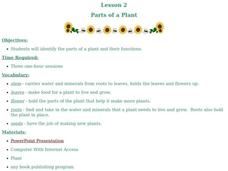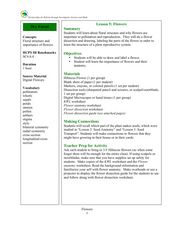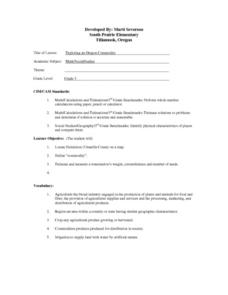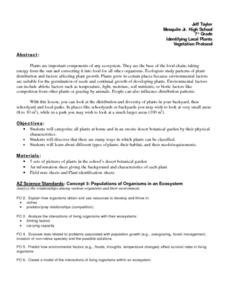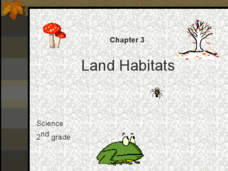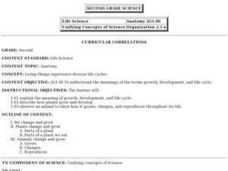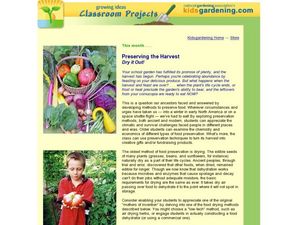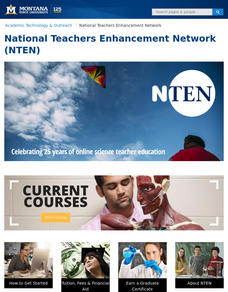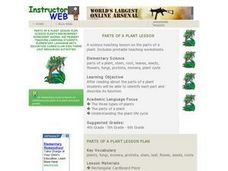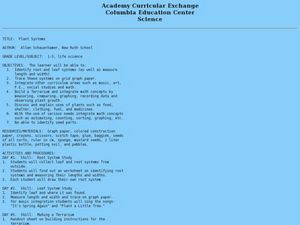Curated OER
Parts of a Plant
Students identify the parts of a plant and their functions. For this plant biology lesson, students view a PowerPoint presentation on plants and their parts and discuss the functions of each part. Students observe a real plant and...
Curated OER
Body Language
First graders investigate the three main parts of a plant. In this plant parts lesson, 1st graders explore vocabulary for the topic and read a story about plant parts. Students view a PowerPoint and take a quiz for the topic. Students...
Curated OER
Dry Forest: Flowers
Students explore botany by examining diagrams. In this plant reproduction lesson, students define a list of plant vocabulary terms and identify plant anatomy from a diagram. Students complete several plant activity worksheets and study...
Curated OER
Preparing the Soil
Students explore the concept of philanthropy. In this service learning lesson, students read Seedfolks and discuss the characters in the story and consider their actions that led to a community garden. Students journal about their...
Curated OER
6: Parts of a Flower
Students draw and label the parts of a flower using a coin from the Northern Mariana Islands. In this flower parts lesson, students look at a transparency of the reverse side of a quarter from the Mariana lslands. They discuss the...
Curated OER
Pumpkins
Observe the differences between the inside and outside of a pumpkin. Learners discuss what pumpkins are used for and then view a pumpkin. Next, they view the inside of the pumpkin and draw the differences they see.
Curated OER
Air Pollution
Students seek solutions to environmental problems. They discover how to conserve and protect natural resources. They examine the role of acid rain on plants and discover how to filter pollutants.
Curated OER
Variations in Growth and Reproduction of Recently Transplanted Prairie Forbes and Grasses
students recognize and name prairie plants without the use of a key. they determine that prairie plants have different life cycles that affect their rate of growth and reproduction
Curated OER
Graphing the Population Explosion of Weeds
Students are introduced to the seed cycle and draw the specific steps. In groups, they identify the human barriers to the spreading of weeds. After calculating the rate of spreading of the Yellowstar Thistle, they create graphs to see a...
Curated OER
Root Caps and the Effect on Gravity Sensing
Students conduct an experiment to determine how the absence of a root cap affects a plant's ability to sense gravity. They make comparisons between capped and decapped roots.
Curated OER
Exploring and Oregon Commodity
A fun (and delicious!) lesson teaches measurement to your third graders. They work in small groups to first predict, then to measure the weight, circumference, and number of seeds found in a watermelon. Everyone gets to eat watermelon...
Curated OER
U.S. History: Antebellum Heroes and Villains
Eighth graders research and write reports on key figures of the Antebellum Period. The projects also include pictures, bibliographies, and timelines about their assigned figure. In addition, 8th graders present oral reports to classmates.
Curated OER
Prairie Predator and Prey
Fifth graders brainstorm a list of animals that live on the prairie, and classify them as predators and prey. They conduct interviews where they ask the animals what they need to look out for to sustain life on the prairie.
Curated OER
Land Habitats: Grade 3 Science
Build your students scientific vocabulary with this slide show on land habitats. Each slide provides a vocabulary word, image, and definition of a term common to habitats and the environment. Great for science class or as comprehensible...
Curated OER
Living Things Experience Diverse Life Cycles
Second graders will study and explain the meaning of growth, development, and life cycle. They describe how plants grow and develop and observe an animal to show how it grows, changes, and reproduces throughout its life.
Curated OER
What is Logging?
Future forestry fanatics absorb information about the impact of the logging industry and then answer ten questions. Everything is included on one webpage, so consider having learners write out their answers on a separate piece of paper....
Curated OER
Preserving the Harvest: Dry it Out!
Students explore how people preserved their food in the past. In food preservation instructional activity, students create different models that enable someone to dry out food, such as a food dehydrator. Students also learn how to...
Curated OER
Tree Identification - Up Close And Personal
Fourth graders go to an outdoor area and are assigned a specific native plant to observe. They read about and answer questions about their tree. They draw the tree. Finally, 4th graders teach the rest of the class about their tree.
Curated OER
Should Soil Be Sterile?
Students determine if the sterilization of topsoil is beneficial to seed germination and plant growth. They grow plants alongside control groups, make and record observations of plant growth and measure plant biomass.
Curated OER
Forest Communities
Students identify tree specimens. In this tree specimens instructional activity, students collect different parts of a tree from the areas around the school or their home. They then work in groups to create booklet that identifies tree...
Curated OER
Exploring Nature: Powerful Forces
Students observe samples of artwork which use line, shape, and form to show movement and depict natural forces of nature. They create their own piece of artwork that shows a natural force and movement and then write a descriptive...
Curated OER
Survey of the Plant Kingdom
In this plant kingdom worksheet, students will review the characteristics of the 12 divisions of the plant kingdom, comparing and contrasting their structures and life cycles. This worksheet has 17 matching, 5 short answer, and 5 fill in...
Curated OER
Parts of a Plant Lesson
Students, after reading about the parts of a plant, identify each part and describe its function.
Curated OER
Plant Systems
Young scholars examine plant systems. For this life science lesson, students explore leaf and root systems on paper in a terrarium that they design and construct.


